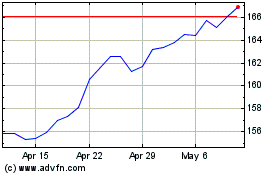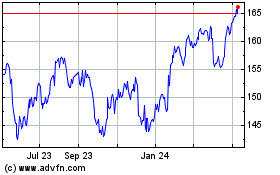By WSJ Staff
Executives around the globe headed back to work Wednesday amid
another radically changed political landscape -- the second big
shift for global businesses in recent months after the Brexit vote
-- as they weighed the ramifications of Donald Trump's surprise
election.
With Mr. Trump's victory, U.S. businesses braced for revamped
trade pacts and a potential crackdown on overseas operations,
coupled with the promise of lower taxes and higher infrastructure
spending at home. Executives in Asia and Europe said they were
hopeful their close ties with the U.S. economy would endure the
political upheaval and heated campaign rhetoric.
In an open letter Wednesday to the President-elect, a group of
CEOs including the leaders of Boeing Co., Procter & Gamble Co.
and United Technologies Corp. expressed an "urgent need to restore
faith in our vital economic and government institutions."
Mr. Trump had harsh words on the campaign trail about big
companies like Ford Motor Co. and United Technologies for moving
jobs and operations overseas. For example, Mr. Trump promised to
slap 35% tariffs on cars imported to the U.S. from Mexico.
"We are aware that there will be times when we disagree on the
specifics of important policies," the CEOs wrote in the letter
organized by the National Association of Manufacturers. "We do
believe, however, that we can be constructive -- both when we agree
and when we do not -- if we can all approach challenging situations
in good faith."
The President-elect has been critical of global trade, the North
American Free Trade Agreement and the Trans-Pacific Partnership, an
agreement to lower or eliminate tariffs between the U.S. and 11
other countries including Japan and Vietnam. He has also been
critical of China, the biggest U.S. trading partner.
"We hope President Trump is more nuanced than candidate Trump,"
said Jake Parker, vice president of China operations of the
U.S.-China Business Council.
General Motors Co.'s "scenario planning" considered ways prior
to the election to avoid tariffs Mr. Trump has threatened, Johan de
Nysschen, president of GM's luxury Cadillac brand, said at a
conference in Lisbon. "It's important to note that we produce for
the global stage not only for North America and that we are able to
divert Mexican production to serve other global markets," Mr. De
Nysschen said.
Mr. Trump's election sent waves through the U.S. healthcare
industry, providing relief to drugmakers worried about the specter
of government price limits but fanning fears for hospital operators
and some health insurers that the Medicaid expansion in President
Obama's health law could get rolled back. That provision had
brought those companies more paying customers.
Mr. Trump has vowed to repeal the Affordable Care Act, though
many analysts think it's unlikely all of the ACA's effects would be
undone. Mr. Trump also took aim at high drug prices during his
campaign, hinting at measures such as re-importation of drugs and
giving Medicare powers to negotiate drug prices to limit price
rises.
"The market wanted the certainty and clarity of a Clinton win --
it may not agree with all of her policy proposals, but it was
comfortable with gridlock," said Brian Gardner, head of Washington
research for the investment bank Keefe, Bruyette Woods.
Mr. Trump has shown himself flexible in his policy positions,
and a grim market response could prompt him and his advisers to
rethink their priorities, predicted Daniel Clifton, head of
Washington research for Strategas Research Partners. "They're going
to sell off on protectionism, but if he's killing the market on
that kind of stuff, he'll change tactics and focus on taxes" and
other domestic issues, Mr. Clifton said.
Mr. Trump has proposed overhauling U.S. corporate taxes by
reducing the corporate rate to 15% from 35%. His plan also provides
for a one-time tax rate of 10% for repatriated corporate profits,
which would help fund plans to spend $1 trillion on new
infrastructure projects.
Caterpillar Inc., the world's largest maker of heavy machinery,
said it welcomed Mr. Trump's promise to boost spending on new roads
and bridges. "We've got a lot to do at home on building our own
infrastructure in this country, and we are excited about some of
the things that [he] has said in this regard," said Kathryn Dickey
Karol, Caterpillar's vice president for global government and
corporate affairs.
Mr. Trump's campaign argues that in addition to forestalling
inversions -- acquisitions that enable companies to re-domicile
abroad -- his tax plan would accelerate U.S. economic growth. "His
view is if you lower the tax rate at the corporate level, more
money is coming back into the country," said Scott Kaplowitch, a
partner at Edelstein & Company LLP. "You would think twice
about investing overseas if the tax rate came down in the U.S."
The National Retail Federation is keeping a close eye on how Mr.
Trump might alter cross-border trade, tax policy and labor laws.
"The retail supply chain is a thoroughly global supply chain," said
David French, senior vice president of government relations at the
NRF on Wednesday. "Anything that threatens two-way trade can hurt
retail and consumers," Mr. French said.
It is unclear how the results could impact consumer sentiment
and spending in the key holiday season. "This morning there are a
lot of people who woke up very surprised," Mr. French said. "The
divisions in the country are going to be hard to heal."
Mr. Trump has said he plans to instruct the U.S. Trade
Representative to bring trade cases against the Chinese to punish
them for allegedly using unfair subsidies to help their companies.
Any friction with China could spell trouble for everyone from Apple
Inc. to Wal-Mart Stores Inc., which rely on Chinese factories to
make many of their products as well as Chinese consumers to buy
them.
MGM Resorts Chief Executive Jim Murren said in an interview
Tuesday that Mr. Trump's rhetoric on foreign countries might
alienate some key casino business interests, including China and
Japan. MGM and two of the other biggest Las Vegas-based casino
companies have built out large portions of their business in Macau,
the Chinese gambling enclave, and also depend on foreign travel to
the U.S. for significant portions of their business.
"There's no doubt that China and America disagree on many, many
topics but there's been a degree of respect," said Mr. Murren, who
is also a chair of the main casino industry trade association, the
American Gaming Association.
U.S. defense stocks rallied in early trading Wednesday as the
prospect of a short-term bump in military spending from the
incoming Trump administration outweighed concerns about a possible
hit to export sales.
Republican control of Congress is expected to pave the way for
an increase in the Pentagon's war fund to tackle conflicts in the
Middle East, though the incoming president hasn't laid out plans
for how he would fund pledges to boost the size of the Army, expand
the Navy fleet and add more combat jets.
There was also hope in the battered U.S. coal business. Robert
Murray, CEO of coal mining company Murray Energy Corp., called Mr.
Trump's election "a great day for coal miners and their families,
and for all Americans who depend on reliable, low-cost electricity,
which coal provides."
But a renaissance for coal and the high-paying unionized jobs
that mining once created in more than a dozen states may prove out
of reach, even with presidential backing. Analysts say the main
culprit for coal's decline is natural gas, which has flooded the
market since the development of hydraulic fracturing, or fracking,
undercutting coal.
(END) Dow Jones Newswires
November 09, 2016 11:53 ET (16:53 GMT)
Copyright (c) 2016 Dow Jones & Company, Inc.
Procter and Gamble (NYSE:PG)
Historical Stock Chart
From Aug 2024 to Sep 2024

Procter and Gamble (NYSE:PG)
Historical Stock Chart
From Sep 2023 to Sep 2024
